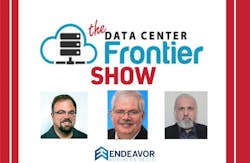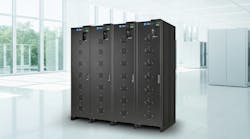DCF Show: Data Center Frontier's Rich Miller Returns For a Visit
For this special episode of the DCF Show podcast, Data Center Frontier's founder and present Editor at Large, Rich Miller, returns for a visit. Tune in to hear Rich engage with the site's daily editors, Matt Vincent and David Chernicoff, in a discussion covering a range of current data center industry news and views.
Topics include: Dominion Energy's transmission line expansion in Virginia; Aligned Data Centers' market exit in Maryland over a rejected plan for backup diesel generators; an update on issues surrounding Virginia's proposed Prince William Digital Gateway project; Rich's take on the recent Flexential/Cloudflare outages in Hillsboro, Oregon; and more.
Here's a timeline of key points discussed on the podcast:
:10 - For those concerned that the inmates might be running the asylum, the doctor is now in: Rich discusses his latest beat as DCF Editor at Large.
1:30 - We look at the power situation in No. Virginia as explained by one of Rich's latest articles, vis a vis what's going to be required to support growth already in the pipeline, in the form of contracts that Dominion Energy has for power. "Of course, the big issue there is transmission lines," adds Miller. "That's the real constraint on data center power delivery right now. You can build local lines and even substations much more quickly than you can transmission at the regional level. That's really where the bottlenecks are right now."
3:00 - Senior Editor David Chernicoff asks for Rich's take on Aligned Data Centers' recent market exit in Maryland, related to its rejected plan for backup diesel generators. "Is this really going to be the future of how large-scale data center projects are going to have to be approached, with more focus put on dealing with permission to build?" wonders Chernicoff, adding, "And are we going to see a more structured data center lobbying effort on the local level beyond what, say, the DCC [Data Center Coalition] currently does?"
5:19 - In the course of his response, Rich says he thinks we'll see just about every data center company realizing the importance of doing their research on the full range of permissions required to build these megascale campuses, which are only getting bigger.
6:12 - Rich adds that he thinks the situation in Maryland illustrates how it's important for data center developers to step back for a strategic discussion regarding depth of planning. "The first thing to know," he points out, "is that Maryand was eager to have the data center industry. They specifically passed incentives that would make them more competitive with Virginia. They saw that Northern Virginia was getting super crowded...and they thought, we've got lots of resources up here in Frederick County, let's see if we can bring some of these folks across the river. And based on that, the Quantum Loophole team found this site."
8:20 - Rich goes on to note how "the key element for a lot of data centers is fiber, and a key component, both strategically and from an investment perspective [in Maryland] is that Quantum Loophole needed to have a connection to the Northern Virginia data center cluster in Ashburn, in Data Center Alley - which is not that far as the crow flies, but to get fiber there, they wound up boring a tunnel underneath the Potomac River, an expensive and time-consuming project that they're in the late stages of now. That's a big investment, and all that was done with the expectation that Maryland wanted data centers."
10:26 - Rich summarizes how the final ruling for Aligned in Maryland "was, effectively, that you can have up to 70 MW but beyond that, you have to follow this other process [where] you're more like a power plant than a data center with backup energy." He adds, "I think one of the issues was [in determining], will all of this capacity ever be turned on all at once? Obviously with diesel generators, that's a lot of emissions. So the air quality boards are wrestling with, on the one hand, having a large company that wants to bring in a lot of investment, a lot of jobs; the flip side is, it's a lot of diesel at a time when we're starting to see the growing effects of climate change, and everybody's trying to think about how we deal with fossil fuel generation. The bottom line is, Aligned pulled out and said, this is just not working. The Governor of Maryland, understanding the issues at stake and the amount of investment that has already been brought there, says that he is working with the legislature to try to 'create some regulatory predictability' for the data center industry. Because it used to be that 70 MW was a lot of capacity, but with the way the industry is going right now, that's not so much."
12:06 - In response to David's reiterated question as to whether the data center industry will now increasingly have to rethink it's whole approach to permitting prior to starting construction, Rich notes, "There's a lot of factors that go into site selection, you're looking at land, fiber, power. The regulatory environment around it, whether there's going to be local resistance, has also become part of the conversation, and rightfully so. One of the things that's definitely going to happen is that data centers have to think hard about their impact on the communities where they're locating, and try to develop sensible policies about how they, for lack of a better term, can be good neighbors, and fit into the communities where they're operating."
14:20 - Taking the discussion back across state lines, Editor in Chief Matt Vincent asks for an update on Rich's thoughts surrounding contentious plans by QTS and Compass Datacenters for a proposed new campus development, dubbed the Prince William Digital Gateway, near a Civil War historic site in Prince William County, Virginia. "This is one of the most unique proposals in the history of the data center industry," explains Miller. "It would be the largest data center project ever proposed. And of course, it's become an enormous political hot potato. It's the first time where we've really seen data centers on the ballot in local elections."
20:41 - After hearing some analysis of the business and political angles in Prince William County, Vincent asks whether Miller thinks the PW Digital Gateway project's future is in doubt, or if it's just that we don't know what's going to happen?
22:50 - Vincent asks Miller for his take on the recent data center outage affecting Flexential and Cloudflare, as written up for DCF by Chernicoff, particularly in the area of incident reports and their usefulness. In the course of responding to a follow-on point by David, Rich says, "I think the question for both levels of providers is, are you delivering on your promises, and what do you need to do to ensure that you can? Let's face it, stuff breaks, stuff happens. The data center industry, I think, is fascinating because people really think about failure modes and what happens, and customers need to do the same."
32:14 - To conclude, Vincent asks for Miller's thoughts on the AI implications of Microsoft's cloud-based supercomputer, running Nvidia H100 GPUs, ranking third on the world's top 500 supercomputers list, as highlighed at the recently ongoing SC23 show in Denver.
Here are links to some related DCF articles:
-- Dominion: Virginia’s Data Center Cluster Could Double in Size
-- Dominion Resumes New Connections, But Loudoun Faces Lengthy Power Constraints
-- DCF Show: Data Center Diesel Backup Generators In the News
-- Cloudflare Outage: There’s Plenty Of Blame To Go Around
-- Microsoft Unveils Custom-Designed Data Center AI Chips, Racks and Liquid Cooling
Did you like this episode? Be sure to subscribe to the Data Center Frontier show at Podbean to receive future episodes on your app.
Keep pace with the fast-moving world of data centers and cloud computing by connecting with Data Center Frontier on LinkedIn, following us on X/Twitter and Facebook, and signing up for our weekly newsletters using the form below.
About the Author
Matt Vincent
A B2B technology journalist and editor with more than two decades of experience, Matt Vincent is Editor in Chief of Data Center Frontier.



